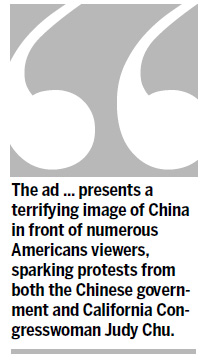Chen Weihua
Offensive political ads sow seeds of hate
Updated: 2011-08-09 07:46
By Chen Weihua (China Daily)

The hostilities and scare tactics in US politics, fully exhibited in the battle over a debt deal and the early sparring in the 2012 presidential race, are so eye-popping that many people may have overlooked an innocent casualty of the fight.
I am talking about China.
While some Americans, mostly writers and businesspeople, have over the years tried to use China's impressive economic growth to prod the US government into action, others, mainly politicians, have sought to win votes by portraying China as a threat and enemy to the United States.
A fundraising advertisement for the 2012 presidential campaign launched on Aug 2 by the Republican National Committee (RNC) is just the latest attempt to try and use China to scare Americans and create enmity between the two nations.
The scene is Jan 20, 2017, the last day of Barack Obama's second term as president, described as a tough year for many as unemployment continues climbing.
"With debt to China reaching a record level, some analysts believe that the Chinese have overtaken the United States," the narrator says, flashing the image of China's national flag behind Obama.
"Eight years ago, we were promised help. Today, many believe their American dream has been lost."
An RNC spokesman, quoted by Fox News, said in a statement that giving Obama four more years would "leave us vulnerable to governments like China."
Here the RNC, in its effort to unseat Obama in 2012, has clearly implied "governments like China" are something evil.
Just a week ago, Crossroads GPS, a Republican-leaning group, also started an ad campaign on major TV channels and networks such as CNN, targeting swing voters.
The ad paints a bleak picture of the US' fiscal future by saying, "America's economy is hanging by a thread under the weight of high unemployment, soaring gas prices, Medicare nearly bankrupt, reckless spending, failed stimulus, a $14 trillion debt, much owned by China."
It urges Americans to take away President Obama's blank check.
And again, China is depicted negatively despite the fact that owning a huge amount of US debt may actually make China a major victim of the US' economic crisis and the debt deal.
Still, these two are not the nastiest US political ads as far as China is concerned.
In late June, Nevada Republican Mark Amodei, who is bidding for a Congressional seat in September, shocked many with his ad featuring the Chinese People's Liberation Army marching on Capitol Hill in Washington DC.
The ad, while sending Amodei's message of opposing any raising of the debt ceiling, presents a terrifying image of China in front of numerous Americans viewers, sparking protests from both the Chinese government and California Congresswoman Judy Chu.
Last October, the Citizens against Government Waste (GAGW), an advocacy group for fiscal conservative policies, also ran an offensive ad campaign.
The fictional ad sets the scene in a Beijing classroom in the year 2030. A Chinese professor is explaining to students why great nations fail.
"The Ancient Greeks, the Roman Empire, the British Empire and the United States of America, they all made the same mistakes, turning their back on the principles that made them great."
While blaming the expanding government spending and crushing debt as a culprit, the Chinese professor, with a sly expression, tells the students: "Of course, we own most of their debt. So now they work for us."
Of course, his words trigger an enthusiastic response from the students in the ad.
There is no doubt that many US Republican politicians believe that such fear-mongering is the best way to hurt Obama.
I am not someone who cannot take a joke. But supposedly serious political ads such as these that promote lies and xenophobia should be stopped and condemned.
For one thing, such ads undermine the hard work of many in the US and China who try to build bridges and foster understanding between the two countries and peoples. Today only about half of the Chinese and Americans view each other's country favorably, according to a Pew Center study released last month.
By advocating enmity between the two countries, these ads will have succeeded in contributing to misunderstandings and tensions, while diminishing the opportunities for the countries to work together.
Nasty political games have infuriated many Americans in the past months and years. Let us hope the tide of opinion will bring an end to such damaging scaremongering.
The author is deputy editor of China Daily US edition. E-mail: chenweihua@chinadaily.com.cn
(China Daily 08/09/2011 page8)

Specials

Star journalist leaves legacy
Li Xing, China Daily's assistant editor-in-chief and veteran columnist, died of a cerebral hemorrhage on Aug 7 in Washington DC, US.

Beer we go
Early numbers not so robust for Beijing's first international beer festival

Lifting the veil
Beijing's Palace Museum, also known as the Forbidden City, is steeped in history, dreams and tears, which are perfectly reflected in design.